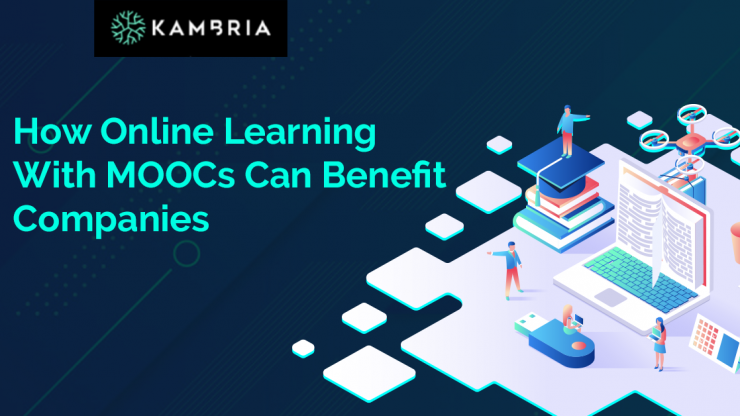
Massive Open Online Courses (MOOCs) have the potential to provide powerful and transformative benefits for many different companies. MOOCs can make training substantially easier and more efficient by providing a massive amount of people with a standardized, easy to access platform that will help them enhance their skills. Despite the usefulness of MOOCs when training employees, many companies still aren’t choosing to invest in MOOCs. Why not?
What kinds of benefits will companies get if they choose to invest in MOOCs? Let’s take a deep dive into the nature of MOOCs, how they operate, and what kinds of benefits they can grant to companies who use them.
What Is A MOOC?
Before we move any further into the use of benefits of MOOCs, let’s make sure that we are clear on the definition. Massive Open Online Courses, AKA MOOCs, are courses hosted on the internet that are open to an extremely large number of people.
MOOCs typically operate with global, professional educators who oversee and guide learners who work on the material from places like home, school, or the office. While individual MOOCs will have their own methods that they use to provide education to their students, in general MOOCs let people enroll for their courses with no pre-requisites.
While many MOOCs are done wholly online, a few MOOCs blend onsite learning with online content.
Training Problems For Companies
Why are online learning platforms like MOOCs attractive to companies in the first place? The reason is that companies looking to grow want to train their employees, helping them gain new skills and abilities.
Yet despite most companies claiming they wish to train their employees, most of them don’t, with only around 15% of employees in the nation receiving employer-funded training. Logistical issues, like the overhead costs and time investments associated with setting up a training program often deter companies from pursuing training for their employees.
Similarly, opportunity costs like giving employees time away from their work stations to be trained, travel to training sites, and study materials are seen as resource drains rather than investments. Due to these kinds of issues, very few companies actually choose to help their employees gain the skills the company desires.
How MOOCs Can Benefit Companies
MOOCs and similar online learning platforms can benefit companies in several ways. They can help solve the logistical training problems that prevent many companies from investing in training for their employees. MOOCs have many advantages over traditional skill training courses.
The fees from MOOCs tend to be much lower than face-to-face training courses, and in addition, there are no associated travel costs. Their online nature also makes them easy to implement in the workplace setting, and they are less disturbing to the company's day-to-day workflow than face-to-face training seminars.
In addition, many MOOCs are comprised of short training modules that can be completed in a relatively short time span, meaning they have value as short notice scale training tools.
In addition, MOOCs let companies train people in highly specialized roles with skills that aren’t necessary for most other employees. These specialized roles can be trained without having to create an entirely new training course for them, reducing the scale of training programs in general.
The Biggest Benefits Of MOOCs for Companies
A recent study conducted by Harvard Business Review suggests that most people who complete an online learning course or MOOC come away with some sort of educational or career benefit, while around 33% of people looking to advance their careers reported a tangible benefit from taking the MOOC. These benefits run the gamut from enabling MOOC takers to find new jobs, start their own business, qualify for a pay increase, or qualify for a promotion.
MOOCs are especially useful for those who come from academically and economically disadvantaged populations. The relative cheapness of MOOCs, as well as their accessibility, let those who cannot afford to pay expensive tuition or take time to go to a college/trade school an opportunity to enhance their skill sets.
Even among the most developed countries, those who have lower levels of education and lower socioeconomic status are more likely to report benefiting from MOOCs. Companies who employ large numbers of economically disadvantaged employees could both grant the disadvantaged with the skills they need to improve their status and enhance the productivity and effectiveness of their workforce.
Why Aren’t More Firms Choosing MOOCs?
There are a number of possible explanations for why more companies aren’t investing in MOOCs. One possible reason is that many companies simply aren’t aware of MOOCs, or else aren’t aware how useful MOOCs can be.
Employees may be hesitant to tell employers they are taking MOOCs, for fear of appearing unmotivated or uncommitted to their current position. The worry is that managers will hear of employees taking MOOCs and assume that their employees are training themselves to start other jobs, or that the MOOCs are simply a waste of time they could be committing to their current positions.
MOOCs may also be viewed as poor replacements for traditional, in-person training courses. This is despite the fact that companies who are already investing in training courses are the ones most likely to utilize MOOCs, which are often used as supplements to in-person training, not complete replacements.
Successes For Companies Using MOOC Training
Among the companies investing in online learning and MOOCs are large corporations like GE, L’Oreal, AT&T and Marks & Spencer. There are numerous other companies creating their own online learning platforms like Tenaris, McKinsey and Microsoft, just to name a few.
Different companies integrate MOOCS in different ways. For example, BNY Mellon has new web developers sit through a web development MOOC offered by Coursera. Meanwhile, L’Oreal enables employees to take enterprise MOOCs as a perk of their employment.
What is common to the different companies that use MOOCs is that they see benefits for enabling their use. After BNY Mellon developers completed Coursera’s full catalogue of developer courses, their developers were able to communicate more effectively because they all had a similar lexicon.
In fact, the research conducted by Harvard Business Review found that around 72% of those who completed MOOCs reported that there were benefits in their career, while 61% of respondents to the research said they had received educational benefits.
There are some caveats to investing in MOOCs that companies should keep in mind. It’s important to provide adequate time to those taking MOOCs, as they are the most effective when they are completed.
It’s also important to remember that MOOCs can be used alongside traditional training methods and that managers can help augment MOOCs by providing supplemental training and guidance.
Through supporting access to online training platforms like MOOCs, companies can grant their employees with the skills that will lead to success. Although many companies do not choose to use MOOCs, those that do have seen notable benefits.
Kambria Educational Programs
Kambria is developing educational and training alliances worldwide alongside partners in India, Bangladesh, Vietnam, Japan, and China. Our online AI courses will provide many benefits to companies interested in leveraging MOOCs for corporate training. Stay tuned as we will launch our online AI courses shortly. Contact Kambria if you’re interested in learning how we can help your workforce gain valuable technical skills.
Email: info@kambria.io
To learn more about tech-related topics, click here.







